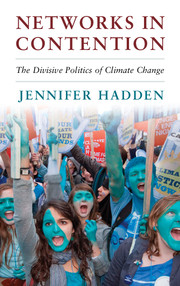Book contents
- Frontmatter
- Dedication
- Contents
- List of Figures
- List of Tables
- Acknowledgments
- Introduction
- 1 The Copenhagen Moment
- 2 The Emergence of a Divided Civil Society Network
- 3 A Network Approach to Collective Action
- 4 Conventional Climate Advocacy
- 5 Climate Justice Activism
- 6 Implications for Climate Change Politics
- Conclusion
- Main Abbreviations Used
- Methods Appendix
- References
- Index
- Books in the Series
6 - Implications for Climate Change Politics
Published online by Cambridge University Press: 05 April 2015
- Frontmatter
- Dedication
- Contents
- List of Figures
- List of Tables
- Acknowledgments
- Introduction
- 1 The Copenhagen Moment
- 2 The Emergence of a Divided Civil Society Network
- 3 A Network Approach to Collective Action
- 4 Conventional Climate Advocacy
- 5 Climate Justice Activism
- 6 Implications for Climate Change Politics
- Conclusion
- Main Abbreviations Used
- Methods Appendix
- References
- Index
- Books in the Series
Summary
So far, I have argued that the network of civil society actors became significantly larger, more diverse, and more divided in the buildup to the Copenhagen Summit. This chapter traces the implications of those developments for climate change politics more broadly. In previous chapters I explained how the growing diversity of groups supported a wider range of tactics than had been previously employed: this resulted in an unprecedented expansion in contention around the UNFCCC in 2009, as I will document here. Changes in civil society participation transformed the UNFCCC from an off-the-radar venue for expert advocacy to a high-profile target of activism. Earth Negotiations Bulletin described this development in 2011:
Climate change COPs have evolved into a carnival-like forum … with a dizzying array of events competing for attention and mindshare. From side events, displays of green technology, marches and protests, to real time commentary over the internet through Twitter, Facebook and thousands of blogs, civil society [meetings] are something that a transparent COP host has to manage.
(Earth Negotiations Bulletin 2011)In this chapter, I argue that these changes in civil society tactics have caused the UNFCCC to become more restrictive in its policing and to seek reform in its procedures for dealing with civil society groups more generally.
I noted in previous chapters how the involvement of a wider range of groups introduced a new way of framing climate change as an issue of climate justice. This approach contrasted with the traditional frame of scientific urgency previously employed by most civil society groups. In this chapter, I examine the success of this frame. I find that the media, states, and other civil society groups have adopted the language of climate justice. I also argue that the frame diffusion has inspired new cleavages in the interstate politics of climate change, as well as a potential, if fragile, convergence in civil society.
- Type
- Chapter
- Information
- Networks in ContentionThe Divisive Politics of Climate Change, pp. 142 - 164Publisher: Cambridge University PressPrint publication year: 2015
- 1
- Cited by



